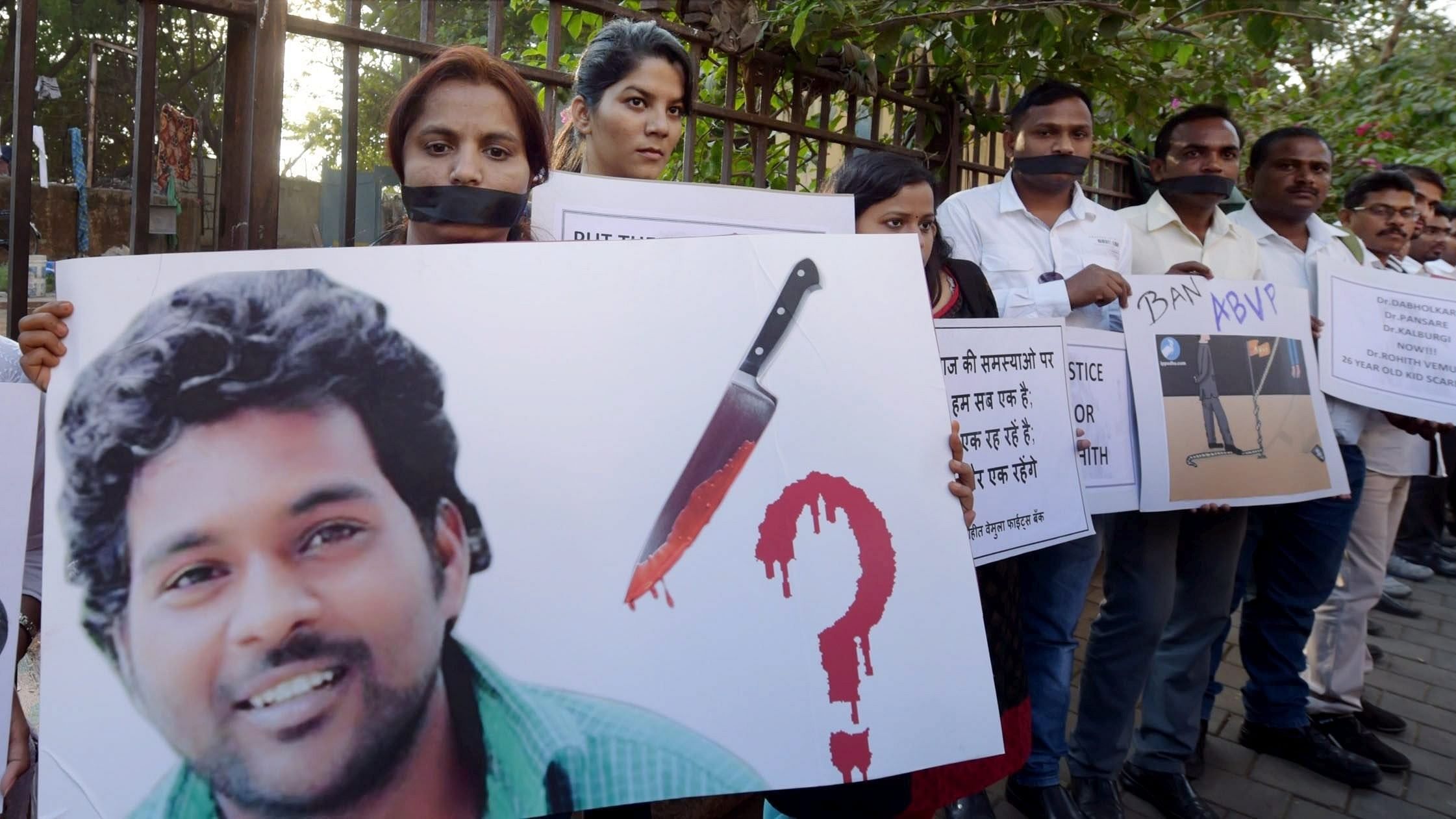
In this Jan 21, 2016 file photo, students stage a protest against the suicide of a Dalit scholar Rohith Vemula in the Hyderabad Central University, in Mumbai
Credit: PTI photo
Rohith Vemula's tragic suicide on January 17, 2016 — after being harassed, denied scholarship and driven to suicide by the University of Hyderabad authorities — erupted into one of the longest protest movements in the country, for the restoration of the dignity of the research student and for punishing those who were the perpetrators of the suicide.
Vemula's suicide note was published in major newspapers and it moved the conscience of the whole nation.
Vemula entered popular cultural imagination in such a way that in 2019, the successful Hindi film Article 15 had a character named Nishad, woven around Bhim Army leader Chandrashekhar Azad, reciting, "My birth is my Fatal accident" from Rohith Vemula's suicide note, before being killed in a fake police encounter.
Rohith’s tragedy left a lasting legacy creating a sustained student movement and activism, invoking his sacrifice as a reminder against discrimination on university campuses.
Punitive legislation to end discrimination on campuses, popularly named ‘Rohith Act’ became a consistent demand. His online diary was published as #Caste is Not a Rumour. Rohith's life and his online diary inspired journalist Yashica Dutt to reveal her Dalit background in Coming Out as Dalit: A Memoir.
The tragic event led to two distinct outcomes. First was invigorating a student's movement. Rohith stirred a whole movement cascading and escalating where campus-based discrimination was challenged all over India, especially in IITs and JNU, and led to rejuvenating Ambedkarite ideological student bodies such as the Ambedkar Students Association (the one Rohith was an active member) in the Universities of Hyderabad, Mumbai, Pondicherry, Kerala, Gujarat and Punjab, and in the Mumbai ad Hyderabad campuses of TISS.
Birsa Ambedkar Phule Students' Association (BAPSA) in JNU and Gujarat; and Ambedkar study Circles — such as Ambedkar Periyar Study Circle IIT-Madras, Ambedkar Phule Study Circle in IIT-Mumbai — started spear-heading protests against discrimination and lack of or denial of scholarships to students. Ambedkar Study Circles (ASC) sprang up in a majority of the colleges in Delhi and other cities and became active. Ambedkarite groups all over the country joined the protest.
Immediately after protests on campuses against Rohith’s suicide, an incident took place in Una, Gujarat on July 11, 2016, which was videographed and stirred the Dalit movement that was already enraged by Rohith Vemula’s suicide. Four Dalits were brutally flogged in Una town for skinning the carcass of cows, which was their traditional occupation. The video spread like a fire. This lead to Dalit Asmita Yatra which concluded in a rally on August 16, 2016, which was addressed by Radhika Vemula, Rohith’s mother, who by then became an icon of Dalit resistance.
In 2019 the tragic suicide of Dr. Payal Tadvi, a postgraduate medical student in Mumbai due to discrimination, led to protests. Radhika Vemula joined Dr, Tadvi’s mother, Abela Tadvi seeking justice. Ever since then, no single event of campus discrimination has gone unnoticed and unprotected in the country.
The second outcome of Rohith’s suicide was the political protests by opposition parties. Former University of Hyderabad student and Telangana Congress leader Mallu Bhatti Vikramarka lead the opposition leaders at the protest site in the university. As the protests spread, a national-level meeting of various political party leaders at Delhi’s Jantar Mantar further fuelled the movement.
On the legal side, the Telangana government initiated proceedings. The investigation had two parts: one was in Andhra Pradesh to which Rohith belonged and the second was in Hyderabad which fell in Telangana state. In 2016, the then government in Telangana, led by the Telangana Rashtra Samiti (TRS) which was not a part of the NDA alliance at the Centre, went ahead with the criminal proceedings. But the Andhra Pradesh government was led by the Telugu Desam party, an NDA partner.
Strangely enough, the caste certificate of Rohith Vemula was challenged during the investigation, even though he was dead. This was because Rohith's biological father, who deserted him and his mother, belonged to a backward caste (OBC), and his mother was a Scheduled Caste. The officials of the Andhra Pradesh government started an inquiry into the caste certificate of Rohith since the criminal proceedings attracted provisions of the Scheduled Castes and Scheduled Tribes (Prevention of Atrocities) Act, 1989. Even though the provisions of the Act require arrests of the accused, none of the accused was arrested under the TRS regime.
The process of verification of a certificate once issued is provided in a judgment in the case of Kumari Madhuri Patil vs. Additional Commissioner, Tribal Development and Others. Like in any basic process, the person whose certificate needs to be verified has to be called for an inquiry and given an opportunity. The process of verification becomes ab initio void because Rohith Vemula died by then. The entire obfuscation of the matter looked like any Dalit who complained of an atrocity would get pressurised to withdraw the complaints. The conviction rate of atrocities was a mere 5.3% in 2016.
Not surprisingly enough, the Andhra Pradesh government went on with the verification of a dead man’s caste and reported that Rohith Vemula’s caste certificate was invalid. To the greater embarrassment of the Congress government in Telangana in 2024, whose leaders led the Rohith Vemula movement, the Telangana police without legally validating the Andhra Pradesh government’s report, filed a closure of the criminal case in March 2024 and made a U-turn on further investigation.
Irrespective of the upheavals in the investigation and the accused getting scot-free, Rohith Vemula’s sacrifice has cemented itself in all protests and resistance movements by Dalits and students in campuses. His legacy is enduring, irrespective of the outcome of his case, and he has embodied the protest of discrimination in higher educational institutions.
(The author teaches Political Science at the University of Allahabad)